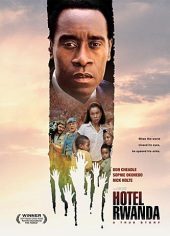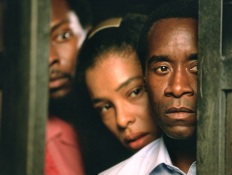| Hotel Rwanda |
| |
 |
Canada/UK/Italy/South Africa, 2004. Rated PG-13. 110 minutes.
Cast:
Don Cheadle, Sophie Okonedo, Nick Nolte, Desmond Dube, Joaquin Phoenix, Hakeem Kae-Kazim, Tony Kgoroge, David O'Hara, Cara Seymour, Fana Mokoena, Mosa Kaiser, Mathabo Pieterson, Ofentse Modiselle, Jean Reno (uncredited)
Writers: Keir Pearson & Terry George
Original Music: Andre Guerra, Rupert Gregson-Williams, Afro Celt Sound System
Cinematography: Robert Fraisse
Producers: A. Kitman Ho, Terry George
Director: Terry George
LINKS
|
Read AboutFilm's Profile & Interview with Sophie Okonedo.
 he idea of an “Important Film” drives me crazy. The notion that great films must have something important to say, and that only films that say something important can be great, calls for judging the social or intellectual value of a film in order to determine whether you enjoyed it. That's no way to go to the movies. Personally, I don't go to hear civics lectures or learn valuable life lessons. I go for the entertainment.
he idea of an “Important Film” drives me crazy. The notion that great films must have something important to say, and that only films that say something important can be great, calls for judging the social or intellectual value of a film in order to determine whether you enjoyed it. That's no way to go to the movies. Personally, I don't go to hear civics lectures or learn valuable life lessons. I go for the entertainment.
I guess there's exceptions to every rule, because having said all that, Hotel Rwanda is an important film. It would be an important film even if it weren't a very good film. Fortunately, it is both.
Hotel Rwanda concerns the horrific Rwandan genocide of 1994, in which the majority Hutus slaughtered the minority Tutsis, as well as any moderate Hutus who opposed them. Led by the Interahamwe militia, radical Hutus killed 937,000 people (officially) in just three months—likely the swiftest genocide in human history.
Pleas for help went ignored by Europe and the United States, who actually scaled down the UN force already stationed there. Today, as the United States and the United Kingdom struggle to justify their invasion of Iraq after revelations about faulty intelligence, no topic could be more relevant or uncomfortable. Why Iraq, and not Rwanda? Why Bosnia, and not Rwanda? Why Panama, or Somalia, or Afghanistan, and not Rwanda? Nothing that happened in those places can compare to the horrors that occurred in this small but densely populated central African nation (the most densely populated on the continent). Could it be because Rwanda is not on any rich nation's doorstep? Could it be because Rwanda doesn't have any oil? Or can the Western world's lack of caring be explained by simple racism? Once you understand what happened in Rwanda, these questions become unavoidable, demanding answers. But few people do know what happened in Rwanda.

Paul and Tatiana Rusesabagina (Sophie Okonedo and Don Cheadle) watch as a neighbor is beaten in Hotel Rwanda. |
Director and co-writer Terry George hopes to change that by bringing to the screen the remarkable, deeply moving story of Rwanda's answer to Oskar Schindler. That man is Paul Rusesabagina (Don Cheadle), the capable house manager at the Sabina-owned Milles Collines Hotel, the finest hotel in Rwanda's capital city, Kigali. Paul, a Hutu, knows how to play the game, bribing suppliers and government officials to keep things running smoothly, and lecturing his Tutsi subordinate Dube (Desmond Dube) on “style.”
When Hotel Rwanda opens, years of fighting between the Hutu-controlled government and Tutsi rebels are about to come to an end in a UN-brokered peace agreement, under the supervision of Canadian Colonel Oliver (Nick Nolte). There are continuing signs of trouble, however. Paul's neighbor is beaten after being denounced as a rebel spy. A hate-spewing radio station called “Hutu Power Radio” incites demonstrations against the agreement, and calls for squashing the infestation of “cockroaches” (the extremists' preferred term for the Tutsi). Paul visits his supplier, George Rutagunda (Hakeem Kae-Kazin), as he receives a shipment of Chinese machetes—George is also the leader of the Interahamwe.
When an airplane with Rwanda's moderate president aboard is shot from the sky, all hell breaks loose. The signal comes over the airwaves to “cut the tall trees” (the Tutsi tend to be taller than the Hutu), and the massacre begins. Under orders not to shoot, the UN troops do nothing. Paul immediately taps into the money he has stored up to save his Tutsi wife, Tatiana (Sophie Okonedo), and their children. Then, against his better judgment, he blows the rest of it to save all of their neighbors, too. Paul shelters them all at the hotel, and the rest of the film becomes Paul's touch-and-go struggle to hold the murderers at bay via persuasion, bribery, and trickery, while hoping for an intervention that will never materialize.
Cheadle gives the audience no trouble believing he is African born. George could not have made a better choice. While Denzel Washington (who has already played another African hero, Stephen Biko) would be the first name normally mentioned for this sort of role, Cheadle proves to be every bit as talented—and ultimately more believable, as he has less star wattage to distract audiences from the character. As his wife Tatiana, British actor Sophie Okonedo (Dirty Pretty Things) shares an natural chemistry with Cheadle and has some of the most beautiful reactions I've ever seen on camera. She is a revelation, and my early choice for this year's best supporting actress. Nick Nolte—particularly in the brief, controversial speech in which he informs Paul no help is coming—and Joaquin Phoenix's small contribution as a frustrated journalist lend the film marquee power, but it belongs to Cheadle and Okonedo.
The film goes to some trouble to show that Hutus and Tutsis are so similar that most people can't tell them apart without asking or checking identity papers. It's a poignant irony, but Hotel Rwanda likely exaggerates when it suggests that the distinction was an invention of Rwanda's German and Belgian colonial masters, who confirmed the Tutsi's dominant social position and used them as collaborators and administrators. Most historians do now believe that the racial distinction made by the Europeans (which argued that the taller, lighter-skinned Tutsi immigrated from East Africa and were somehow more Caucasian) is entirely spurious. It is also true that the Europeans freely reclassified people's ethnicity to suit their political purposes. However, some sort of distinction between Hutu and Tutsi far predated the arrival of European colonists.
Regardless, Hotel Rwanda succeeds because it doesn't try to be an object history lesson. Nor does the film repeatedly pound you over the head with sickening images—it's not even rated R. The scope of the film is never larger than Paul's point of view. The story and the characters generate their own gripping tension and emotional devastation, which is horror enough. Paul may be an African Schindler, but this film isn't just a transposed Schindler's List. Filmed on location in Kigali and South Africa, Hotel Rwanda conveys more of a documentary-style truth, because it feels less artistically manipulated. It is an important film to see, but its “importance” does not alone make it good. It only makes a powerful film even more worthy of your time.
Suggested reading: We Wish to Inform You That Tomorrow We Will Be Killed With Our Families: Stories from Rwanda, by Philip Gourevitch.
Review © November 2004 by AboutFilm.Com and the author.
Images © 2004 United Artists Films, Inc. All Rights Reserved.


